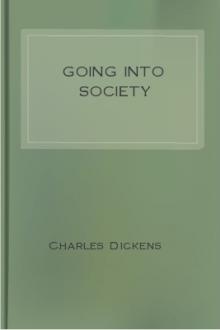Books author - "Charles Dickens"

licia and the angelic baby."What is the matter, Papa?" "I am dreadfully poor, my child." "Have you no money at all, Papa?" [Illustration: "What is the matter, Papa?"] "None my child." "Is there no way left of getting any, Papa?" "No way," said the King. "I have tried very hard, and I have tried all ways." When she heard those last words, the Princess Alicia began to put her hand into the pocket where she kept the

e ricks in farmers' yards. Out-door work was abandoned, horse-troughs at road- side inns were frozen hard, no stragglers lounged about, doors were close shut, little turnpike houses had blazing fires inside, and children (even turnpike people have children, and seem to like them) rubbed the frost from the little panes of glass with their chubby arms, that their bright eyes might catch a glimpse of the solitary coach going by. I don't know when the snow begin to set in; but I know that we were

een taught to write, by the young man without arms, who got his living with his toes (quite a writing master HE was, and taught scores in the line), but Chops would have starved to death, afore he'd have gained a bit of bread by putting his hand to a paper. This is the more curious to bear in mind, because HE had no property, nor hope of property, except his house and a sarser. When I say his house, I mean the box, painted and got up outside like a reg'lar six-roomer, that he used to creep

As a child I was melancholy and timid, but that wasbecause the gentle consideration paid to my misfortune sunk deepinto my spirit and made me sad, even in those early days. I wasbut a very young creature when my poor mother died, and yet Iremember that often when I hung around her neck, and oftener stillwhen I played about the room before her, she would catch me to herbosom, and bursting into tears, would soothe me with every term offondness and affection. God knows I was a happy child at

Courier; the whole house is at the service of my best of friends! He keeps his hand upon the carriage-door, and asks some other question to enhance the expectation. He carries a green leathern purse outside his coat, suspended by a belt. The idlers look at it; one touches it. It is full of five-franc pieces. Murmurs of admiration are heard among the boys. The landlord falls upon the Courier's neck, and folds him to his breast. He is so much fatter than he was, he says! He looks so rosy and so

For its being a little gloomy, he had hired it principally for the gardens, and he and my mistress would pass the summer weather in their shade.'So all goes well, Baptista?' said he. 'Indubitably, signore; very well.' We had a travelling chariot for our journey, newly built for us, and in all respects complete. All we had was complete; we wanted for nothing. The marriage took place. They were happy. I was happy, seeing all so bright, being so well situated, going to my own city, teaching my